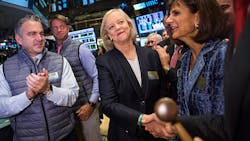Hewlett Packard Enterprise Makes $100 Million Bet on Startups
Meg Whitman, CEO of Hewlett Packard Enterprise, sat down with her top lieutenants last month at the Palo Alto headquarters to evaluate a technology storage company and a data-center-tools startup. She analyzed product details, asked about capital expenditures, and wondered about energy efficiency. The businesses, though, aren’t the billion-dollar acquisition targets that her company has been known for.
They’re startups hoping to win investments from HPE’s venture capital arm.
Putting money into startups is a way for the company to contend with new technologies from rivals like Amazon.com Inc. and Google. It’s also an effort to end a checkered spending pattern on acquisitions in the past decade. The business is still making purchases — it acquired Aruba Networks for roughly $3 billion last year — but venture investments provide an opportunity to make cheap bets on promising companies. HPE’s VC arm aims to do about 10 to 12 deals annually and has already closed a couple this year.
“The stakes have gotten very high for them,” IDC analyst Crawford Del Prete said. “It’s just a low-risk way to see if those companies play with where HP’s strengths are.”
The Hewlett Packard Ventures program, also known as Pathfinder, is targeting startups that focus on big data, security, and the cloud and data center. Lak Ananth, managing director of the group, said it intends to invest approximately $100 million this year. That would roughly match what it gave to startups in 2015, its first full year. The company might invest $5 million to $10 million in an expansion-stage round — and potentially invest more in later rounds, according to Ananth.
Whitman is personally involved. Every quarter she hosts “Coffee With Meg” gatherings, listens to presentations from startups, asks pointed questions, and helps decide who will get the company’s money. Her engagement has been key for Florian Leibert, CEO of Mesosphere, a data-center software provider that raised $73.5 million in March, led by HPE. “That was a big reason why we were really excited,” he said. “She continues to be really responsive.”
Whitman’s VC push comes after witnessing huge writedowns that cost the company more than $15 billion early in her tenure. In 2011, under Whitman’s predecessor Leo Apotheker, HP announced it would spend $10.3 billion on British software maker Autonomy Corp. A year later the company said it was writing down about 85% of Autonomy’s value. Also in 2012, it said it would write down about $8 billion after purchasing Electronic Data Systems four years earlier.
In November, HP underwent a massive corporate split from what’s now called HP Inc., which sells computers and printers. Now, Hewlett Packard Enterprise — which provides servers, storage gear, and tech services — is counting on the smaller, nimbler structure to better navigate the fast-changing corporate tech market.
Pathfinder is a way for HPE to be involved with more experimental ideas and products. It’s not aiming for VC-style returns, though it doesn’t want to lose money, either, COO Chris Hsu said. “The purpose of this is for us to actually be in the market all the time, understanding the emerging technologies,” he said.
Corporate venture capital is nothing new; Google and Intel Corp. both have investment arms. In 2015 there were 801 corporate venture capital units, up 79% from 2011, according to Global Corporate Venturing, a research group. That includes archrival Dell Inc. and HP Inc.
Pathfinder has about 10 people and should have closer to 15 by the end of the year, Ananth said. That puts it among the larger players; three-fourths of corporate firms have five people or fewer devoted to venture capital, according to Toby Lewis, chief analytics officer of Global Corporate Venturing. Ananth said the group is also looking at possibly expanding internationally and getting into new fields such as artificial intelligence.
Already, HPE is seeing gains from its investments. One customer, Ananth said, was considering moving some of its spending to Amazon’s cloud. After an introduction to Pathfinder, the customer was intrigued to see HPE had newer options. The startup sales team is now working alongside the HPE account team for that customer. Requests from customers are helping drive which companies get investments, Ananth said.
There’s a lot of competition to back hot startups, but HPE’s name stands out among Silicon Valley’s many VCs; software startups want to work with the storied company to sell products. Chef Software raised $40 million from HPE and others last year and has already seen benefits from the relationship.
“They bring customers,” Chef CEO Barry Crist said. “They bring a lot of enterprise experience — and a lot of reach.”
By Brian Womack
About the Author
Bloomberg
Licensed content from Bloomberg, copyright 2016.
